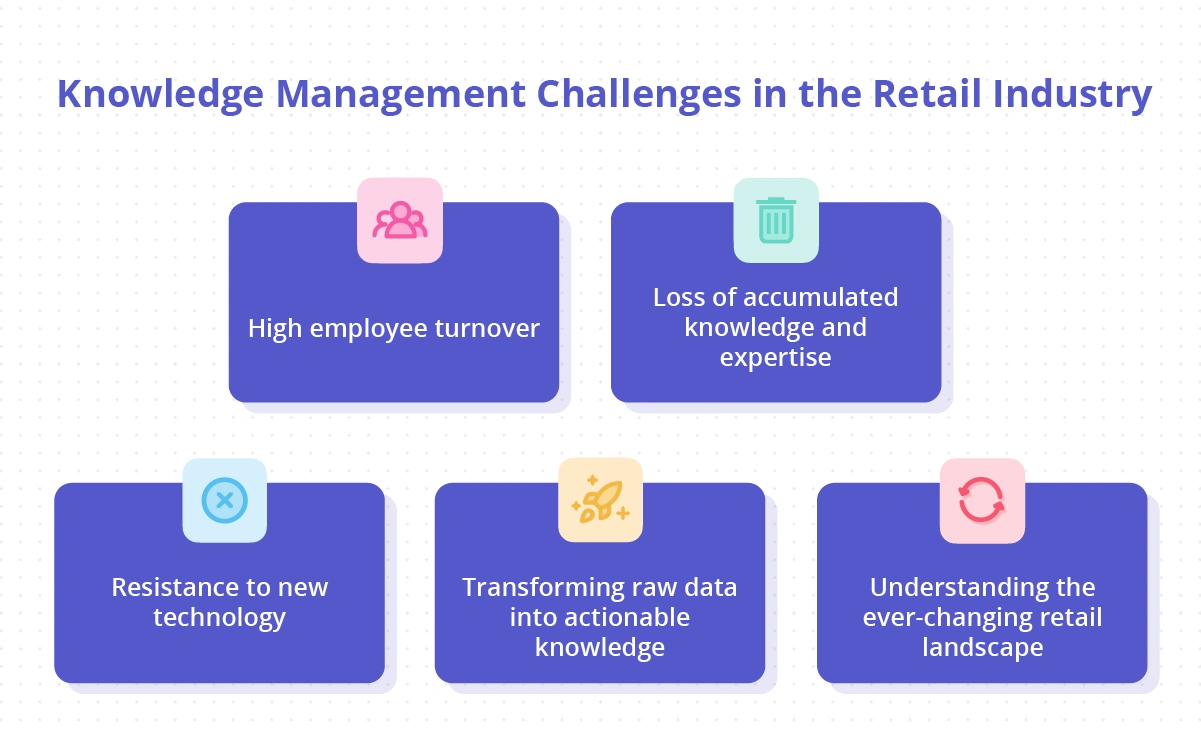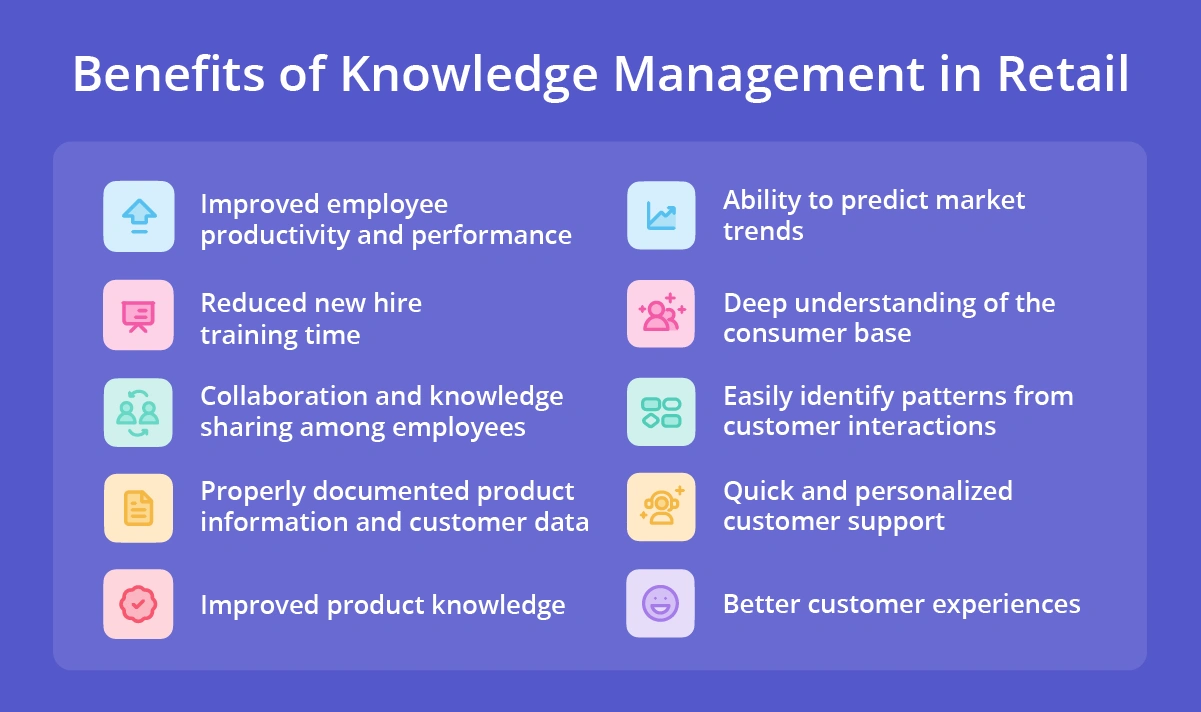Knowledge management in the retail industry embodies the process of purposefully and systematically managing the information, expertise, and insights generated across various channels of the organization. This process is heavily intertwined with a retail organization's overall strategy, culture, and operations, bearing profound transformative potential for retail businesses.
The retail industry is characterized by rapidly changing customer behavior and expectations, a need for operational efficiency, and intense competition, with global retail sales projected to equal close to 33 trillion dollars by 2026. The ability to capture, analyze, share, and utilize knowledge effectively has emerged as a necessary ingredient for sustained success.
The role of knowledge management in the retail industry
The essence of knowledge management in retail revolves around tailoring customer experiences and improving decision-making processes. Many of these outcomes can be realized through big data analytics, part of the broader umbrella of knowledge management.
Big data, in the context of retail, refers to the massive amounts of consumer data that are generated at every point interaction, including:
- Online and mobile shopping
- In-store purchases
- Customer service calls
When harnessed effectively through the application of sophisticated analytical tools and algorithms, big data can provide crucial insights into consumer behavior, preferences, and patterns. These insights can lead to improved selling propositions and increased profitability by delivering:
- Personalized experiences
- Tailor product offerings
- Optimize inventory management
- Enhance marketing effectiveness
- Predict future trends
The formidability of knowledge management's strategic role lies not just in capitalizing on big data but also in facilitating the sharing and implementation of the knowledge derived from data across the organization. This shared and implemented knowledge yields multi-fold benefits by enhancing decision-making, fostering innovation, and engendering a more responsive and agile business model.
The application of robust knowledge management systems and different types of knowledge management form an essential pillar in the fortification of a retail business against the challenges and opportunities of today’s dynamic marketplace. Without doubt, knowledge management conjures a wealth of opportunities through which retail businesses can leverage intelligence to navigate the tempestuous tides of modern market dynamics.
The importance and impact of knowledge management in retail
Knowledge management is amplifying the success of retail businesses by leaps and bounds. The importance of knowledge management in the retail industry is undeniable as it has the following impact on business.
- Harnesses the effective creation, dissemination, and utilization of company-wide knowledge.
- Empowers retailers with comprehensive understanding of customer behavior, allowing them to respond efficiently to consumer needs and trends.
- Improves the decision-making process by allowing retailers access to detailed analysis and data. By sorting and processing wide-ranging information that includes buying trends, customer satisfaction levels, and even online reviews, retailers are enabled to make strategic decisions that lead to revenue growth and increased customer satisfaction.
- Bridges the gap between retailer and customers by facilitating the customization of shopping experiences, thereby enhancing customer service.
- Enables retailers to predict a customer’s future purchases based on their past buying habits, preferences, and shopping history.
- Assists in identifying the most effective ways to communicate with customers, thus strengthening the bond between retailer and consumer.
- By cataloguing and analyzing data related to warehouse inventory, employee performance metrics, and sales trends, retailers can streamline operations to enhance efficiency and profitability.
- Uses the acquired knowledge of their experienced employees to accelerate training and time to proficiency.
Beyond the tangible benefits, the importance and impact of knowledge management in retail is monumental in constructing a business model that is resilient, efficient, and customer-centric. It lays the groundwork for a retail business to thrive in a fiercely competitive market, making it a cornerstone of modern retail industry practices.
Challenges of knowledge management in retail
Knowledge management within the retail sector faces an array of challenges, all of which can make the difference between successful operations and missed opportunities.
Employee turnover
The retail industry is characterized by a high rate of personnel change, with the annual employee turnover among frontline retail workers at 60%, which can lead to a significant loss of accumulated knowledge and expertise. This exodus of shared wisdom can have deleterious effects on customer service, operational efficiency, and ultimately, profitability.
Rapidly evolving technology
New technology breeds both new opportunities and challenges within knowledge management in retail. As rapidly evolving technology dictates the pace of retail operations, the ability for retail businesses to stay current with the latest tools and their related processes becomes paramount. However, this adaptation does not come without complications. The successful implementation of new technology is not an instantaneous process, and training can demand substantial investment in terms of both time and capital.
Converting data into knowledge
The transformation of data into knowledge denotes one of the significant challenges of knowledge management in retail. The onslaught of data generated within retail operations is incessant. Every purchase, every customer interaction, and every logistics operation can potentially generate useful data. However, the swift and accurate refinement of this raw data into actionable knowledge is a challenge. It demands effective and sophisticated data analytics systems, paired with a nuanced understanding of the retail landscape to distill salient insights from the burgeoning heaps of data.
By successfully managing these challenges, a retail business can derive an unparalleled advantage. With a tactical knowledge management system at its core, retail businesses can improve customer service, increase operational efficiency, and ultimately, drive profitability.

Big data and knowledge management in retail
Big data and knowledge management in retail represents an intriguing intersection of informational scope and detailed insight, increasingly defining the contemporary landscape of the sector worldwide.
Big data refers to the massive amount of data generated every moment in the retail industry. This data can come from numerous sources like Point-of-Sale systems, online transactions, customer feedback, and more. Knowledge management, on the other hand, is the process of capturing, organizing, and utilizing this information effectively and efficiently. Together, they form a powerful alliance that has the potential to revolutionize the retail industry.
Retail, already known as a data-rich industry, is transitioning from traditional operational methods to advanced data analytics, with 69% of organizations that utilize big data analytics reporting significant improvements in their knowledge management capabilities.
Benefits of big data and knowledge management in retail are manifold. The power of big data lies in its volume, variety, velocity, and veracity, offering retail businesses unprecedented insights into customer behavior, preference trends, and operational efficiency.
Coupled with knowledge management, a systematic process for capturing, distributing, and effectively using the knowledge generated, this integration provides retailers with a superior competitive edge by allowing retailers to:
- Forecast demand more accurately
- Optimize inventory
- Improve customer service
- Formulate tailored marketing strategies
- Enhance sales and profitability
Big data and knowledge management in retail offer vast potential for retailers to understand their customers better, improve operations, and drive profitable growth. With continuous technological advancements and evolving digital trends, the relevance and importance of this integration are set to increase further in the near future.
Top benefits of knowledge management in retail
The heartbeat of any successful retail organization lies in its ability to manage and utilize its vast reservoir of knowledge effectively. The essence of knowledge management in the retail industry unravels numerous benefits.
Boosts employee performance and productivity
Knowledge management fosters an environment conducive to knowledge sharing through seamless collaboration among employees, bolstering productivity, performance and proficiency. Employees can easily navigate the product information and provide prompt customer service, leading to an enhanced shopping experience.
A knowledge management system provides employees with data and insights without the need for prolonged searches, allowing them to focus on their primary tasks. Moreover, a well-implemented knowledge management system reduces new hire training time, as all the necessary data is readily available for quick learning.
Provides an in-depth understanding of the consumer base
A well-implemented knowledge management system can offer valuable insights into consumers' buying habits, preferences, and feedback by highlighting their unique preferences and purchasing behavior. This allows retailers to tailor their offerings and marketing tactics to meet customer expectations effectively.
Through a knowledge management system, retailers can easily identify patterns from customer interactions. These patterns can then be used to optimize store layouts, personalize marketing campaigns, and improve in-store customer experiences, ultimately contributing to increased customer loyalty.
Improves ability to predict market trends
By analyzing the accumulated data from past transactions and customer interactions, retailers can identify patterns, enabling them to forecast future trends accurately. This array of data can be used to predict the popularity of certain product lines, facilitating more accurate planning and smarter marketing strategies.
Gains a competitive edge
Knowledge management ensures sustainability in an ever-evolving marketplace. With the retail landscape becoming increasingly digital, the importance of strategic knowledge management is more pronounced than ever before. As businesses navigate through the sea of retail data, it is the management of this knowledge that will direct them towards progressive growth and success.
Facilitates informed decisions
Managing a retail business requires an in-depth understanding of the market, customers, and product variety. Knowledge management comes into play here, providing a strategic platform that enables retail businesses to gain strategic insights. It's important to understand that knowledge management is not just about collecting data but intelligently using it to enhance business operations.
Enhances product knowledge
As the retail sector becomes increasingly crowded, customers now, more than ever, value retailers who can provide expert guidance. Knowledge management ensures that employees are armed with the latest product information, making them better able to serve customers and set the business apart from the competition. Additionally, through better product knowledge, retail businesses can enhance their product placement strategies, thus elevating the overall sales performance.
Improves customer experiences
Knowledge management allows businesses to understand their customer base and offer tailored support. Such personalization not only fosters a positive buying experience but also cultivates customer loyalty. Moreover, quick access to critical information facilitates prompt responses to customer queries, promoting overall customer satisfaction.
A cascade of benefits of knowledge management in retail follows from properly documented and analyzed customer data. The data analysis results in a better customer experience— as customers can be provided with personalized support based on their shopping history and preferences.

The future of knowledge management in retail
The retail industry is amid a seismic shift, where data is playing an increasingly critical role in decision-making processes. The current focus lies heavily on how to turn this data into actionable intelligence. Knowledge management tools enable businesses to understand their customers' preferences, recognize their behavior patterns, all while making these insights accessible in real-time.
Analyzing key factors such as customer demographics, buying habits, and customer feedback, knowledge management greatly augments a company in any industry, from financial services to retail, the ability to maintain a competitive edge. Impeccable knowledge management can provide several benefits, including reduced time spent locating important information, better decision-making capabilities, enhanced collaboration, increased learning and innovation, and improved customer experience.
As we look ahead, the future of knowledge management in retail is undeniably exciting, promising many opportunities for technological advancement. With the rise of artificial intelligence and machine learning, companies can anticipate a deeper layer of insights and more extensive decision-making capabilities. Advancements like AI-powered software, personalized marketing, and automated knowledge management are just the beginning.
Ultimately, such advancements will redefine the retail industry and determine how companies respond to the ever-changing customer landscape. The evolution of the knowledge management system will position retailers to adapt swiftly and successfully to these changes, which is why it is often hailed as the future of the retail industry.
Visit our retail industry page to learn more about how the strategic implementation of knowledge management can empower your team to provide top-notch service whether it’s a customer’s first interaction with your brand or post-purchase customer care.



